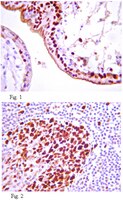05-1571 Sigma-AldrichAnti-IGF-1R Antibody, clone 24-57
This Anti-IGF-1R Antibody, clone 24-57 is validated for use in IH, IP for the detection of IGF-1R.
More>> This Anti-IGF-1R Antibody, clone 24-57 is validated for use in IH, IP for the detection of IGF-1R. Less<<Productos recomendados
Descripción
| Replacement Information |
|---|
Tabla espec. clave
| Species Reactivity | Key Applications | Host | Format | Antibody Type |
|---|---|---|---|---|
| H | IHC, IP | M | Purified | Monoclonal Antibody |
| References |
|---|
| Product Information | |
|---|---|
| Format | Purified |
| Control |
|
| Presentation | Purified mouse monoclonal IgG1κ in buffer containing 0.1 M Tris-Glycine (pH 7.4, 150 mM NaCl) with 0.05% sodium azide. |
| Quality Level | MQ100 |
| Physicochemical Information |
|---|
| Dimensions |
|---|
| Materials Information |
|---|
| Toxicological Information |
|---|
| Safety Information according to GHS |
|---|
| Safety Information |
|---|
| Storage and Shipping Information | |
|---|---|
| Storage Conditions | Stable for 1 year at 2-8°C from date of receipt. |
| Packaging Information | |
|---|---|
| Material Size | 100 µg |
| Transport Information |
|---|
| Supplemental Information |
|---|
| Specifications |
|---|
| Global Trade Item Number | |
|---|---|
| Número de referencia | GTIN |
| 05-1571 | 04053252363559 |
Documentation
Licencias necesarias
| Título |
|---|
| PRODUCTO REGULADO POR LA SECRETARÍA DE SALUD |
Anti-IGF-1R Antibody, clone 24-57 Ficha datos de seguridad (MSDS)
| Título |
|---|
Anti-IGF-1R Antibody, clone 24-57 Certificados de análisis
| Cargo | Número de lote |
|---|---|
| Anti-IGF-1R, clone 24-57 | 2485684 |
| Anti-IGF-1R, clone 24-57 - 2410231 | 2410231 |
| Anti-IGF-1R, clone 24-57 - 2066717 | 2066717 |
| Anti-IGF-1R, clone 24-57 - 2205005 | 2205005 |
| Anti-IGF-1R, clone 24-57 - 3025881 | 3025881 |
| Anti-IGF-1R, clone 24-57 - 3232421 | 3232421 |
| Anti-IGF-1R, clone 24-57 - 3323028 | 3323028 |
| Anti-IGF-1R, clone 24-57 - 4227707 | 4227707 |
| Anti-IGF-1R, clone 24-57 - NG1838620 | NG1838620 |
| Anti-IGF-1R, clone 24-57 - NRG1697045 | NRG1697045 |







